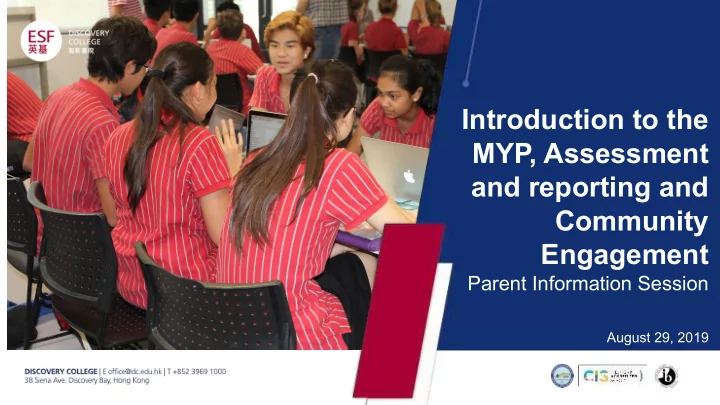

Introduction to the MYP, Assessment and reporting and Community Engagement Parent Information Session August 29, 2019
Agenda • The IB Middle Years Programme (MYP) at Discovery College • IB programme continuum • MYP curriculum • Assessment and reporting • Community Engagement
Introductions Annette Garnett Jonny Tate IB MYP Coordinator / Secondary VP CAS / CE Coordinator and Community Liaison
Mission and vision Discovery College Grow . Be passionate about being the best we can be. Discover . Find wonder in the world around us. Dream . Dare to make a difference for yourself, humanity and our planet.
Mission and vision IB Mission statement Discovery College The International Baccalaureate aims to Grow . Be passionate about being the best develop inquiring, knowledgeable and we can be. caring young people who help to create a better and more peaceful world through Discover . Find wonder in the world intercultural understanding and respect. around us. These programmes encourage students Dream . Dare to make a difference for across the world to become active, yourself, humanity and our planet. compassionate and lifelong learners who understand that other people, with their differences, can also be right.
IB learner profile – lifelong learning
The IB – a continuum of education IB PYP to IB MYP IB MYP to IB DP / CP
IB MYP Curriculum features Balanced curriculum • Approaches to Learning • Interdisciplinary learning • Community Engagement • Personal Project (Y11) •
IB MYP Curriculum subject groups Mathematics Individuals and societies • • Sciences (Geography, Economics and • English Language and Literature History) • Languages other than English: Design (materials, food, • • systems) Chinese language acquisition • Physical and Health Education • Spanish language acquisition • Arts Group: Drama, Music and • Chinese Language and • Visual Arts literature
IB MYP Curriculum & Approaches to learning Skill category Skills clusters Thinking Critical thinking, creativity and innovation, reflection and transfer Social Collaboration Communication Interaction and literacy Self-management Organisational and affective skills Research Information and media literacy, and critical literacy Specific Approaches to Learning (ATL) skills are taught depending on the inquiry’s learning objectives
IB MYP Assessment and reporting Overview: Unit by unit reporting - Reporting on achievement each unit of work • Semester 1 and 2 synoptic reports • Two three-way conference events • NB: more details on MYP assessment practices will be provided in the Term 1 “Assessment in the MYP Parent Workshop” later in Term 1 ( 16 September: 8:35 - 10am 4/F Student Centre ).
Community engagement • Experiential learning • An opportunity for students to engage in collection of meaningful experiences that they develop, participate in and reflect upon. • Core of the MYP - Community Project, Service, Action • Students decide what experiences they wish to pursue • Completed both within and outside of the school timetable
Grow. Be passionate about being the best we can be. Discover. Find wonder in the world around us. Dream. Dare to make a difference for yourself, humanity and our planet.
MYP Community Engagement • All MYP students required to be involved in community engagement (service) activities, aiming to encourage empathy and respect for the needs of others • Involvement in Creativity and Activity also required • Experiences will vary both in nature and degree of student involvement across the different year levels
Creativity ‘Exploring and extending ideas leading to an original or interpretive product or performance’ ● Art, drama, dance, music ● Developing a website ● Teaching ● Photography ● Learning a new language ● Developing a project ● Model United Nations ● Writing short stories
Activity ‘Physical exertion contributing to a healthy lifestyle’ ● Football ● Netball ● Yoga ● Kayaking ● Trampolining ● Golf ● Dance ● Jungle trekking / expeditions
Service ‘Collaborative and reciprocal community engagement in response to an authentic need ’ ● Creating a community group ● Teaching basic literacy ● Habitat for humanity ● Student council ● HEO ambassadors ● Peer tutoring (to junior students) ● Volunteering with the elderly ● Environmental stewardship
Finding opportunities
The Community Engagement framework 4 stages in the CE Framework - Investigation - Planning - Taking action - Reflecting
What is expected? Students show evidence that you have worked towards achieving the following Learning Outcomes: 1. Identify strengths & develop areas for growth 2. Undertake new challenges, develop new skills 3. Plan and initiate CE experiences 4. Work collaboratively with others 5. Show perseverance and commitment 6. Engage with issues of global significance 7. Consider the ethics of choices and actions Students show evidence of their achievement in their individual reflections (MYP CE portfolio on Ding).
Importance of CE in the MYP programme • Personal growth • Understand rights and responsibility as a global citizen • Healthy mind, body and soul • To complement academic studies • Stress release • Fun • Pursue interests and hobbies Essential 21st Century Skills • Accountability and Adaptability • Interpersonal and Collaborative Skills • Creativity and Intellectual Curiosity • Information and Media Literacy • Critical Thinking • Communication Skills • Social Responsibility • Self-Management
CE Monitoring and Reporting • Learning Advisor monitors involvement. • Qualitative rather than quantitative. • Sharing involvement and learning • CE Portfolio and presentations / discussions with their peers and supervisor • Reported on Semester reports
How can parents support •Develop an understanding of the programme •Encourage and discuss involvement •Help students find opportunities •Facilitate participation
CAS Q&A
Contact details Annette Garnett Jonny Tate annette.garnett@dc.edu.hk jonny.tate@dc.edu.hk
Recommend
More recommend